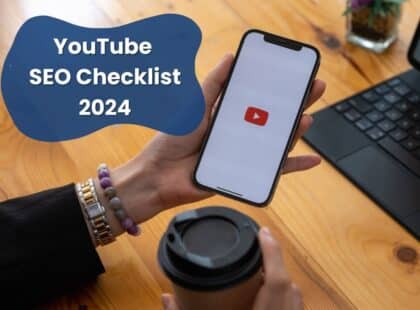
What Is YouTube SEO? 2024 YouTube SEO Checklist
In today’s fast-paced digital world, video content has become a crucial me [...]

In the digital world, keyword search is essential for driving traffic, improving visibility, and reaching potential customers. But for entrepreneurs and small businesses, understanding the right approach to keyword research can be challenging. What are the best tools? How can you find the best search keywords? And more importantly, how can you leverage this knowledge to optimize your website and grow your business?
Table of Contents
In this guide, we’ll break down the keyword research process, discuss its importance, and explain how to choose the right keywords for your SEO strategy to boost your online presence.
Keyword research is the practice of identifying the words and phrases that people use to search for products, services, or information online. For small businesses and entrepreneurs, mastering keyword research is crucial to creating relevant content and improving SEO performance.
By understanding the keywords your target audience uses, you can better align your content with their search intent, making it more likely that your site will rank highly on search engine results pages (SERPs). This process helps you understand the language your target audience uses and how you can structure your content to match those searches. As a result, your website is more likely to appear in search engine results, driving organic traffic to your site.
Additionally, focusing on the right keywords ensures that your marketing efforts are focused on attracting relevant users who are interested in your products or services, ultimately increasing the chances of conversion.
The importance of keyword research cannot be overstated. Without it, you risk creating content that no one is searching for, which means less traffic, fewer conversions, and missed opportunities.
According to Forbes, 68% of all online experiences start with a search engine.
This means that entrepreneurs and small businesses must align their content with the high search volume, low competition keywords that their target audience is using.
Additionally, Ahrefs reveals that 90.63% of all web pages get zero traffic from Google.
That’s why it’s essential to know how to find top keywords in Google Analytics and other tools to ensure your website doesn’t fall into that statistic.
For entrepreneurs and small businesses, keyword research offers another significant advantage: cost efficiency. Instead of wasting resources on paid search campaigns that may not yield results, focusing on organic keyword strategies can help small businesses compete with larger players without breaking the bank.
Keyword research involves several key elements that every entrepreneur should consider when optimizing their SEO strategy:
By understanding these elements, entrepreneurs and small businesses can make informed decisions about which keywords to target for their website. This also allows you to create a targeted content strategy, ensuring that each piece of content addresses a specific user need or intent.
For example, if you’re focusing on informational queries, you could write blog posts, how-to guides, or explainer videos. For transactional queries, you might want to focus on product pages, case studies, or testimonials that encourage conversions.
Building an SEO strategy based on effective keyword search involves using the right tools and techniques. Here’s how you can get started:
Seed keywords are the foundation of your keyword research. These are broad terms that define your business. For instance, if you run an online bakery, seed keywords might include “custom cakes” or “best wedding cakes.” From here, you can generate more specific best search keywords using keyword tools.
There are many tools available that can help you find the top keywords in Google Analytics and identify valuable phrases for your SEO strategy. Platforms like Google Analytics give you insight into which keywords are already driving traffic to your site. In addition, tools like Ahrefs and SEMrush help you discover high search volume, low competition keywords that can boost your visibility.
Keyword tools also allow you to filter results by metrics such as difficulty, competition, and search volume, ensuring that you’re not just targeting any keyword but the ones most relevant to your business goals.
Pro Tip: Ahrefs reports that 90.63% of web pages get no organic search traffic from Google. This underscores the importance of choosing the right keywords and optimizing your content accordingly.
One of the best ways to find the best search keywords is by researching your competitors. Look at what keywords they rank for and how you can fill in the gaps by targeting similar but less competitive terms. This can be an easy way to find keywords that your audience is already searching for but might not yet be heavily targeted by competitors.
After gathering a list of potential keywords, organize them based on the search intent. This helps you structure your content so that it answers the specific needs of users at different stages of their buyer’s journey. For example, some users may be looking for general information, while others may be ready to make a purchase.
By following these steps, entrepreneurs and small businesses can find the right keywords that will drive more traffic to their websites.
Finding and choosing the right keywords can feel overwhelming at first, but breaking the process down makes it more manageable:
Long-tail keywords are more precise, lengthier phrases with greater conversion rates and generally less competition. For example, “how to find the best bakery for wedding cakes” is more specific (and easier to rank for) than “best cakes.”
Long-tail keywords also tend to have more user intent behind them, meaning the people who search for these terms are often closer to making a purchase decision. This makes them ideal for small businesses and entrepreneurs looking to attract highly targeted traffic.
Balancing high search volume and low competition keywords is essential for your SEO success. While high-volume keywords can bring more traffic, they often have more competition, making it difficult for small businesses to rank. On the other hand, long-tail keywords can be easier to rank for and often attract users closer to making a purchasing decision.
After determining your target keywords, distribute them thoughtfully throughout your writing. Use them in headings, meta descriptions, and body text. But be careful not to overdo it—search engines like Google penalize websites for keyword stuffing. Your goal should be to create content that is informative and valuable, while naturally incorporating your keywords.
Another important tactic is to optimize for best search keywords by integrating them into your site’s technical elements, such as title tags, alt texts for images, and URL slugs. Doing so will give your website a comprehensive SEO boost across multiple dimensions.
For entrepreneurs and small businesses, effective keyword search can make or break an SEO strategy. By understanding how to find top keywords in Google Analytics, researching best search keywords, and targeting high search volume, low competition keywords, you can significantly improve your website’s visibility and drive more traffic.
SEO is an investment, but with the right approach, the return on investment can be tremendous. Ready to optimize your website for success? Reach out to Marketing Spotlight for a free consultation and learn if SEO is the right channel for your business.
Don’t wait—contact Marketing Spotlight today to get a custom SEO strategy and start driving more traffic to your website!

I’ve had a smooth experience working with Marketing Spotlight team. They helped me develop a website, create a marketing strategy and set up marketing automation.

Marketing Spotlight transformed our marketing efforts with their automation services. The seamless integration and efficiency they brought to our campaigns have been a game-changer. Our customer engagement in the UAE has never been better!
The meeting link will be shared with you via email after you finish booking a call.